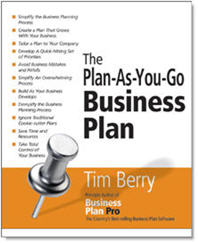Irony: I’m a business planner, and I have been for 30 years now; but the biggest decisions of my real life have been remarkably unplanned.
I could rewrite my own history backwards to make it all seem like it had been planned, but it wasn’t. Going from hippy to business planner to entrepreneur, I tripped over the most important right decisions, accidentally. It was a lot like a shiny metal ball bouncing around in a pinball machine, hitting obstacles and changing directions. Sometimes I made the wrong decisions and got the right results. Go figure.

For example, in college I studied what interested me: Literature. I wasn’t making a career choice, I was taking the path of least resistance. It was an easy step from Literature to Journalism, and — after 10 years with UPI and McGraw-Hill and others — from there to the MBA. And in 30-some years of business I keep meeting people whose careers seem to reconfirm the basic wisdom of studying what interests you. These are people who followed that path of interest and found, later, that it led to the right place.
All of which could end up as dangerously bad advice, I suppose: if taking the downhill path leads only downhill. Sometimes you have to buckle down and work; but at least, if you’re doing something that interests you, the work feels better. That was certainly my case. I got my first job in journalism in Mexico City, by mail plus a plane trip from Oregon, because I was happy to work cheap and they guessed that since my wife is Mexican I probably spoke Spanish (which wasn’t true until a few months later). There was no planning there; it was a job, in 1971, when jobs were scarce (as they are now). It seemed to prove the wisdom of taking that pinball-like change of direction.
The next time I changed direction it was for the money. I switched to business writing from regular wire-service news journalism after three years of it because my wife and I had two kids by then and with kids, money became an issue. Before that, neither one of us cared that much. Journalism had enjoyed an aura of save the world for a while, but that gets old. That change doubled my income (from very little to a little bit more). I waded slowly and fearfully into business writing with about as much enthusiasm as an ophidiophobe (fear of snakes) wading into a jungle swamp. At first, it was just a sellout; but then it got interesting. I took business classes at night school. I really wanted to know what was going on underneath the press releases, in the numbers, where the truth hides.
So it took me 10 years to get from undergrad studies to business school, but that wasn’t a bad thing. By the time I got there I was — notice the theme here — once again interested in what I was supposed to be studying. I’d had enough of business journalism to want to actually know what I had been writing about (novel idea) and that made business school fascinating. And my years as journalist helped me get through business school while working full-time in consulting. I could write fast, and that’s a good thing in school.
I made some very bad decisions that created very good outcomes. In some circles, we call that luck. Later I quit a good job to go on my own writing computer books, but with the help of my wife and my favorite former client, that became business plan consulting. And that — again with the help of my wife and some clients — became business plan software. It seemed like a natural progression. Just as it was critical to write for readers in Journalism, it was even more critical to write for users in software. And all of this changing directions meant that it wasn’t until 1994, 20 years after switching to business writing, 11 years after leaving that good job, that Business Plan Pro was first released.
And, while we’re on the general subject of unanalyzed decisions with good outcomes, doing what you want, in 1969 I asked a girl to marry me after knowing her about two weeks. Next January we’ll have a 40th anniversary. (And we both agree we were lucky. Don’t try this at home. Wait longer.) And at every key moment from literature to journalism to business to entrepreneurship, it was always two of us, never just me. When things were really dicey — like when we realized we had three mortgages and $65K credit card debt in developing Palo Alto Software — it was never “you idiot, what have you done,” but rather “we’ll take the risk together, and if we fail, we’ll fail together.” Knowing that you’re not going to lose a marriage over it makes it a lot easier to change directions.
http://timberry.bplans.com/2009/09/confessions-of-a-hypocritical-business-planner.html

 one thing harder than forecasting is trying to run a business without a forecast.
one thing harder than forecasting is trying to run a business without a forecast. 

 which deals with (among other things) some Zen-like contradictions and paradox in real business planning. Your business plan is always wrong, but vital. A good business plan is never done. Consistency is critical except when it isn’t. Plan for change. Do what you use, do what you need, no more. The plan is what you want to happen, not the document, not the presentation. And so forth.
which deals with (among other things) some Zen-like contradictions and paradox in real business planning. Your business plan is always wrong, but vital. A good business plan is never done. Consistency is critical except when it isn’t. Plan for change. Do what you use, do what you need, no more. The plan is what you want to happen, not the document, not the presentation. And so forth.  Good point, Kate. Here’s a revised version to the right. It adds community as a fourth leaf.
Good point, Kate. Here’s a revised version to the right. It adds community as a fourth leaf.
